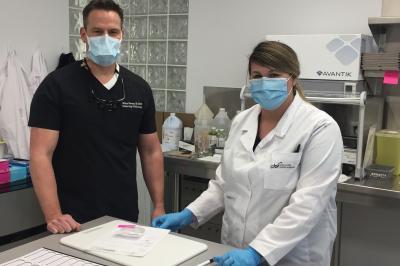Nova Scotia’s new micrographic surgery program brings care and cure closer to home

As a medical laboratory technologist (MLT) with the QEII Health Sciences Centre’s anatomical pathology lab for 15 years, Alison Jones is used to helping diagnose cancers. Her latest role with Nova Scotia Health’s new micrographic surgery program has her excited to be playing a direct role in the cure.
Jones and her colleagues, Robin Paris-Adams and Robert Smith, provide on-site laboratory services for the new skin cancer treatment program, which is also known as Mohs, for Dr. Frederick Mohs who developed the treatment.
Since the program launch on November 2, nearly 200 skin cancer patients have already been able to access the treatment here in the province. It is estimated that 1,200 patients could benefit from Mohs micrographic surgery each year.
“This program is amazing for our province, our patients and it is an amazing opportunity to be on this team. It is a nice feeling knowing that I am coming to work and being part of the treatment that can cure their cancer,” said Jones.
Traditional treatments for certain types of skin cancers can have two limitations, both of which can result in added treatments, added costs, travel and stress for patients, and can affect their outcomes.
In some cases traditional treatments can result in too much healthy tissue being removed, along with the tumor, resulting in the need for significant reconstructive surgeries, physical deformities or restrictions.
In other cases, too little tissue may be removed, meaning that harmful and potentially deadly cancer cells remain, along with the need for additional procedures to prevent their cancer from returning or advancing.
Skin cancers can be like ice-burgs; what you see at the surface is just a small part of a larger structure.
Mohs is a minimally-invasive surgery that allows health care providers to target cancerous tissues at and below the surface with precision, while saving as much healthy tissue as possible. This can be especially important for skin cancers on the head and neck, including the nose, ears, eyelids, lips and scalp.
During Mohs surgery, a specially-trained team, including a dermatologist and nurses, work to gradually remove small portions of tissue. These small samples are stained (to make cells more visible and easy to distinguish) and orientated, then taken to an adjacent laboratory where they are further prepped by a medical laboratory technologist to be examined by the surgeon. This step is repeated until there is no evidence of cancerous cells in the outside edges of the samples.
Mohs increases the chance of a cure and reduces the need for additional treatments or surgery.
It also prevents patients from having to wait for tissue samples to be sent for testing and them waiting, often weeks, for confirmation that no evidence of cancer remains. This means they can have their cancer removed and reconstruction of their wound all in the same day.
For many years Nova Scotia patients have travelled to New Brunswick, or other locations for Mohs, but support from the Department of Health and Wellness, and a partnership with Dr. Michael Stevens; Nova Scotia’s only dermatologist with micrographic surgery training, now allows patients to access the life-changing and potentially life-saving care, closer to home.
“This has become the standard of care for certain types of skin cancers and we have had a very positive response from our patients so far,” said Dr. Stevens.
The Nova Scotia Health service is being delivered in an outpatient clinic setting and patients are advised to expect to be at the clinic for most of the day for their surgery and reconstruction and will often read, or watch a movie waiting. How long the whole procedure takes depends on the size and complexity of their cancer and how many layers need to be removed and tested. Most patients will return for a follow-up appointment in the weeks that follow their procedure and some patients with more complicated cancers may also require a check-in at the three-month mark to assess their progress.
To support the program, Nova Scotia Health identified the trio of medical laboratory technologists, along with four registered nurses with operating room experience, to undergo specialized training. The Mohs program team members will rotate between the clinic and their normal roles.
Registered nurses Lauren Croft and Roxanne Jecks were the first nurses to begin supporting Mohs surgeries in the program’s first few weeks of operations. Their colleagues, Connie Llewelyn, Lori MacMillan and Ayla Messanger are also supporting the program.
“Because all they need is localized freezing, our patients are awake and talking to us during their procedure and while testing takes place,” said Croft, who has spent most of her four years as a nurse with sedated patients in the Halifax Infirmary operating rooms.
“I am used to telling my patients to ‘pick a nice dream and I will see you when you wake up’, but it is nice to chat with our patients. They love the idea of going the home the same day, knowing that their cancer has been removed and that they don’t have to wait for their results or reconstruction.”
Jecks also enjoys the more personal connection and change of pace working in an outpatient clinic setting.
After more than 20 years as an operating room nurse supporting mostly general, vascular and plastics surgeries, she thinks it is exciting to have a program like this available for our patients.
“We’ve had patients tell us that they’ve been waiting for this program, or who have had the surgery elsewhere, and are just so impressed with the efficiency of our clinic and happy that they can access this care here,” she said.
“We have a great team and Dr. Stevens is meticulous. He really wants to do the best job and works with patients to give them different options for their reconstruction, so they are comfortable, and it is what the patients want.”
Nova Scotia will be using Mohs surgery to treat some skin cancers involving the head and neck including basal cell and squamous cell carcinomas, which are two of the most common skin cancers. It will also be used for some more rare forms of skin cancer known as adnexal carcinomas.
Skin cancer patients may be referred for the surgery by their specialist or primary health care provider if they meet the Mohs criteria.
Mohs can be most beneficial for treating patients who have cancers that:
- could have a high likelihood of recurring or that have recurred following other treatments
- are diagnosed in areas where preserving as much healthy tissue as possible is important
- have edges (borders) that are hard to distinguish from healthy tissue
- are large or aggressive/advanced.
A demonstration of how Mohs works, which is shared with Nova Scotia Health patients, can be seen here (Source: American College of Mohs Surgery – ACMS).
Nova Scotia has some of the highest rates of skin cancer in Canada, including basal cell carcinomas and squamous cell carcinomas, which are most common in Caucasian populations.
While some skin cancers can be linked to genetic or inherited factors, the vast majority of skin cancers are caused by too much exposure to the sun’s harmful UV rays throughout one's life -- specifically sun tanning and sun burns, or from tanning bed exposure. Skin cancer can be largely preventable through changes in behaviour that focus on avoiding indoor tanning and limiting unprotected time in the sun, while still living a healthy, active lifestyle. Learn more about how sun safety can help prevent cancer.



